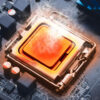The need for ultra-high-speed storage continues to grow in a world full of cutting-edge technologies. This has only become more apparent with the introduction of SD Express cards. The latest generation SD cards can deliver SSD-level performance and reliability and offer a host of advanced security features.
What is an SD Memory Card?
Secure Digital cards (SD) are small flash memory cards designed explicitly for high-capacity memory with a high data transfer rate and low power consumption.
SD cards use flash memory that provides non-volatile storage, which means a power source is not needed to retain any stored data. All SD cards are designed with the same interface standard, allowing them to be used interchangeably across multiple devices.
Benefits of Using an SD Card
The industrial demand for memory and storage solutions has grown significantly over the past few years. The development of SD technology and its integration into many different mission-critical applications are the main reasons for this growth. These advancements have led to significant benefits such as:
- Endurance: A robust design with no moving parts makes it durable enough to withstand extreme temperatures, shock, vibration, and rough handling.
- Physical Size: Efficiently utilized in space constraint applications.
- Storage Capacity: Supports up to 128TB, making it ideal for infotainment and surveillance systems.
- SMART Monitor: Provides real-time monitoring and reporting of important operating parameters.
- Stability: Non-volatile memory preserves its contents even when there is a power failure, loss of signal, or other external factors.
- Security: The latest SD specification 9 offers a secured hidden memory, fast boot capabilities, write-protect, and replay protection security mechanisms.
- High Data Transfer Rate: SD Express cards can reach a maximum 4GB/sec transfer rate.
- Power management: Uses very little power compared to other non-volatile internal storage devices.
Different Types of Flash Memory in SD Cards
SD cards have different capabilities. Each type varies widely in reliability, affecting its speed, cost, and capacity. Accelerated Memory Production, Inc. offers three major types of industrial-grade SD cards;
SLC Cards (Single Level Cell)
SLC cards store only one bit per flash memory cell, reducing memory capacity. However, they provide higher speeds, 100,000 read/write cycles, and operate at extended temperature ranges, which increases the cost of SLC cards.
MLC Cards (Multi-Level Cell)
MLC cards store more than one bit per cell, resulting in higher capacities than SLC. This provides a good balance of performance, price, and endurance. However, they have 25-30 times less endurance than Single-Level NAND Flash, often prone to many issues in long-term usage.
pSLC Cards (Pseudo Single-level Cell)
This hybrid solution takes advantage of both single-level cells along with multi-level cells. They are five times more durable than MLC cards but have a reduced memory capacity and are 50% cheaper than SLC cards.
How to Pick the Best SD Card!
Several factors determine an SD card’s suitability for various applications. And each type of card has its advantages and disadvantages regarding performance, storage, and durability limit.
Industrial Grade (SLC Cards) – For industrial use and workloads that require high throughput, low latency, and reliable operation over a wide range of temperatures.
Commercial Grade (MLC Cards) – For everyday consumer devices like smartphones, tablets, and digital cameras, which need high-speed access to large amounts of storage.
OEM Grade (pSLC Cards) – Designed for OEMs with strict requirements regarding product quality and manufacturing standards.

Looking For Industrial Grade SD Cards? Contact AMP, Inc.
We at Accelerated Memory Production, Inc. offer a comprehensive portfolio of SD cards for today’s networking, communication, enterprise, and embedded industrial market requirements. Our team of experts will assess your needs and help you pick the best-suited SD card for your application. Call us at 714-460-9800 to get started!





